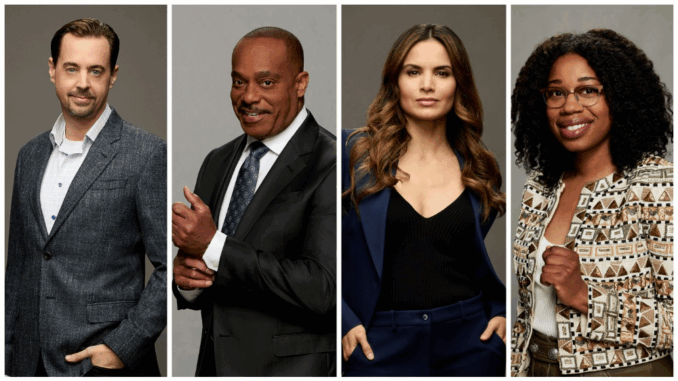
For over two decades, NCIS has captivated audiences with its blend of military drama, intricate case-solving, and a team of charismatic investigators. While the show is a procedural at its core, its enduring success has always been rooted in the deep, personal connections between its characters. The show has a long and complicated history of romantic relationships, from the simmering “will they, won’t they” of Tony DiNozzo (Michael Weatherly) and Ziva David (Cote de Pablo) to the quiet, steadfast bond of Tim McGee (Sean Murray) and Delilah Fielding (Margo Harshman). But there is one romantic relationship that, more than any other, has served as the moral and emotional anchor of the entire series. It’s not the most passionate, the most dramatic, or the most talked about, but it is, without a doubt, the most important: Leroy Jethro Gibbs (Mark Harmon) and Dr. Samantha Ryan (Jamie Lee Curtis).
While their relationship was brief and, to some fans, a footnote in the show’s long history, the romance between Gibbs and Dr. Ryan was a masterstroke of character development. It was a relationship that did something no other romance on the show had ever done: it forced Gibbs to confront his deepest traumas, to open his heart to a possibility of a new beginning, and to finally reckon with the ghost of his past. The relationship was not just a plot device; it was a profound character study that served as a turning point for the show’s most enigmatic and beloved character.
The Unlikely Pairing: A Study in Contrasts
At first glance, the pairing of Gibbs and Dr. Ryan seemed completely out of left field. Gibbs was a man of few words, a hardened veteran with a long list of emotional scars. He was a man who lived by his “rules” and who had, for years, resisted any form of emotional intimacy. Dr. Samantha Ryan, a brilliant and compassionate psychologist, was his complete opposite. She was expressive, direct, and had a warmth that seemed to be in stark contrast to Gibbs’s stoicism.
Their first meeting was a classic “meet-cute” that was both hilarious and filled with tension. They were two people from different worlds, and their dynamic was a brilliant study in contrasts. She was an expert in the human mind; he was a master of the human heart (or, rather, a man whose heart was deeply guarded). Their interactions were a perfect blend of witty banter and profound emotional connection. She challenged him in a way that no one else had ever dared to. She didn’t just see him as a hero or a leader; she saw him as a person, a man with a past who was in desperate need of a future.
The Purpose of Their Romance: Confronting the Past
The relationship between Gibbs and Dr. Ryan was a powerful vehicle for exploring Gibbs’s character in a way that the show had never done before. For years, the show had hinted at the trauma of his past, particularly the murder of his wife, Shannon, and his daughter, Kelly. This tragedy was the defining moment of his life, a wound that had never truly healed. It was a wound that had, for years, prevented him from moving on, from forming a deep and meaningful romantic relationship.
Dr. Ryan’s character, as a psychologist, was perfectly positioned to help him confront this trauma. She was not just a love interest; she was a catalyst for change. Their relationship was not just about two people falling in love; it was about one person helping another to heal. In a particularly poignant scene, she encourages him to talk about his past, to finally open up about the pain that he had been holding onto for so long. It was a conversation that was a long time coming, and it was a moment that fundamentally changed Gibbs as a character.
Their relationship was the first time that Gibbs truly allowed himself to be vulnerable. He opened his heart to a new person, and in doing so, he took a major step toward healing. The relationship was a powerful message to the audience: that even a man as hardened as Gibbs could find love again, that even the deepest wounds could be healed.
The Lasting Impact: A Change in Character
While their romance was brief, its impact on Gibbs’s character was profound and lasting. After his relationship with Dr. Ryan, Gibbs was a changed man. He was more open, more emotionally available, and more willing to connect with his team on a personal level. The relationship had chipped away at his emotional walls, and it had forced him to see the world in a new way.
The relationship also served as a powerful metaphor for the show’s own evolution. The show, which had started as a dark and serious procedural, had, over the years, become a show that was more about family and human connection. The romance between Gibbs and Dr. Ryan was a perfect example of that evolution. It was a relationship that was not just about solving a case; it was about solving a person. It was a relationship that was not just about the law; it was about the heart.
The legacy of the Gibbs-Ryan romance is a testament to the show’s willingness to take risks, to explore the complexities of its characters, and to tell a love story that was not just about a “ship” but about the power of love to heal and to transform. It was a romance that was not just about two people falling in love; it was about one man learning to love again. And that, in the end, is a story that is more important than any other.